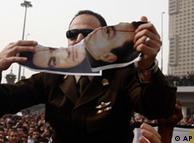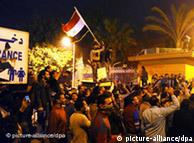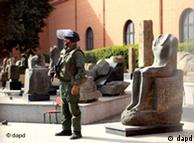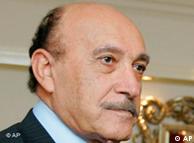DEMOCRACY | 29.01.2011
Egypt remains tense as Mubarak and protesters hold their ground
Both opposition protesters and Egyptian president Hosni Mubarak held their ground on Saturday during a fifth day of violent nationwide protests.
While Mubarak forced his cabinet's resignation and named a new prime minister and his first-ever vice president on Saturday. He appointed intelligence chief Omar Suleiman as his deputy and former civil aviation minister Ahmed Shafik as prime minister. But the reshuffle failed to satisfy protesters, who demanded that the president end his 30-year rule over the country.
Witnesses in Cairo said the soldiers maintained a non-aggressive posture as they kept watch over large crowds of up to 50,000 protesters, who showed open hostility towards police.
 Protesters said they would stay in the streets until Mubarak stepped down
Protesters said they would stay in the streets until Mubarak stepped downProtesters could be seen standing atop tanks, taking pictures with the soldiers. Many were jubilant, pumping their fists, waving the Egyptian flag, singing.
One tank was sprayed with the slogan, "Down with Mubarak," while protesters carried banners that said "The people have spoken."
In one incident, army forces opened fire with live ammunition on a crowd that tried to storm the country's interior ministry, reportedly killing two and injuring another. The bodies of several dead protesters were seen carried by angry demonstrators.
Medical officials said that at least 92 people had been killed across Egypt and thousands had been injured since the anti-government riots erupted on Tuesday.
Vigilantes fight off looters
Social order disintegrated in Cairo Saturday as police withdrew from the streets when the army took over security for the city. Witnesses reported mobs storming supermarkets, commercial centers, banks, private property and government buildings in Cairo and elsewhere.
Egyptians have called for army intervention to bring back law and order. On Saturday, many protesters chanted "No to plundering and no to destruction."
Civilians armed with sticks and razors - and sometimes guns - have formed vigilante groups to defend their homes from looters in both poor and wealthy parts of the city.
International pressure
Meanwhile, the international community on Saturday increased pressure on Mubarak to deliver on his promises for reform.
German Chancellor Angela Merkel, British Prime Minister David Cameron and French President Nicolas Sarkozy issued a joint statement late Saturday urging Mubarak to avoid violence "at all costs.”
"We call on President Mubarak to avoid at all costs the use of violence against unarmed civilians, and on the demonstrators to exercise their rights peacefully," said the statement.
"We urge President Mubarak to embark on a process of transformation which should be reflected in a broad-based government and in free and fair elections."
German Foreign Minister Guido Westerwelle also threatened Saturday to reduce aid to Egypt if authorities did not ease off a crackdown against demonstrators.
Egypt is one of the largest recipients of German development aid, according to the foreign ministry website, with some 5.5 billion euros ($7.5 billion) sent to Egypt since the 1960s and more than 200 million euros pledged last June for the next two years.
"Our appeal to the Egyptian government is clear: abandon all forms of violence and (support) the right to demonstrate," Westerwelle said. "Germany stands on the side of freedom of expression and democracy."
US State Department spokesman PJ Crowley also expressed harsh criticism in his Twitter feed Saturday, writing "The Egyptian government can't reshuffle the deck and then stand pat."
Nobel peace laureate Mohamed ElBaradei, former head of the International Atomic Energy Agency, who returned Thursday to Cairo from Vienna, strengthened his call for Mubarak to go.
"I respect Omar Suleiman and Ahmed Shafik, but we want an end to this Pharaonic regime," the would-be opposition leader told broadcaster Al Jazeera.
Author: David Levitz (AFP, Reuters)
Editor: Kyle James
dw




No comments:
Post a Comment